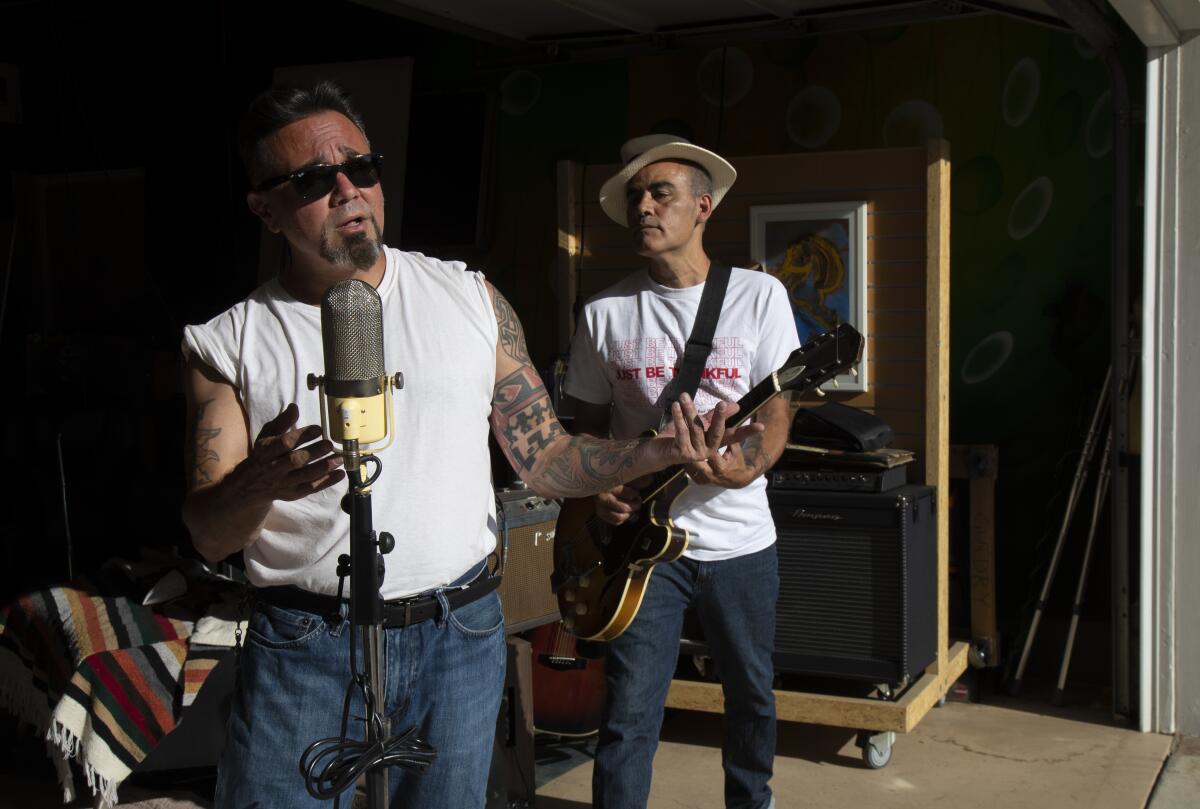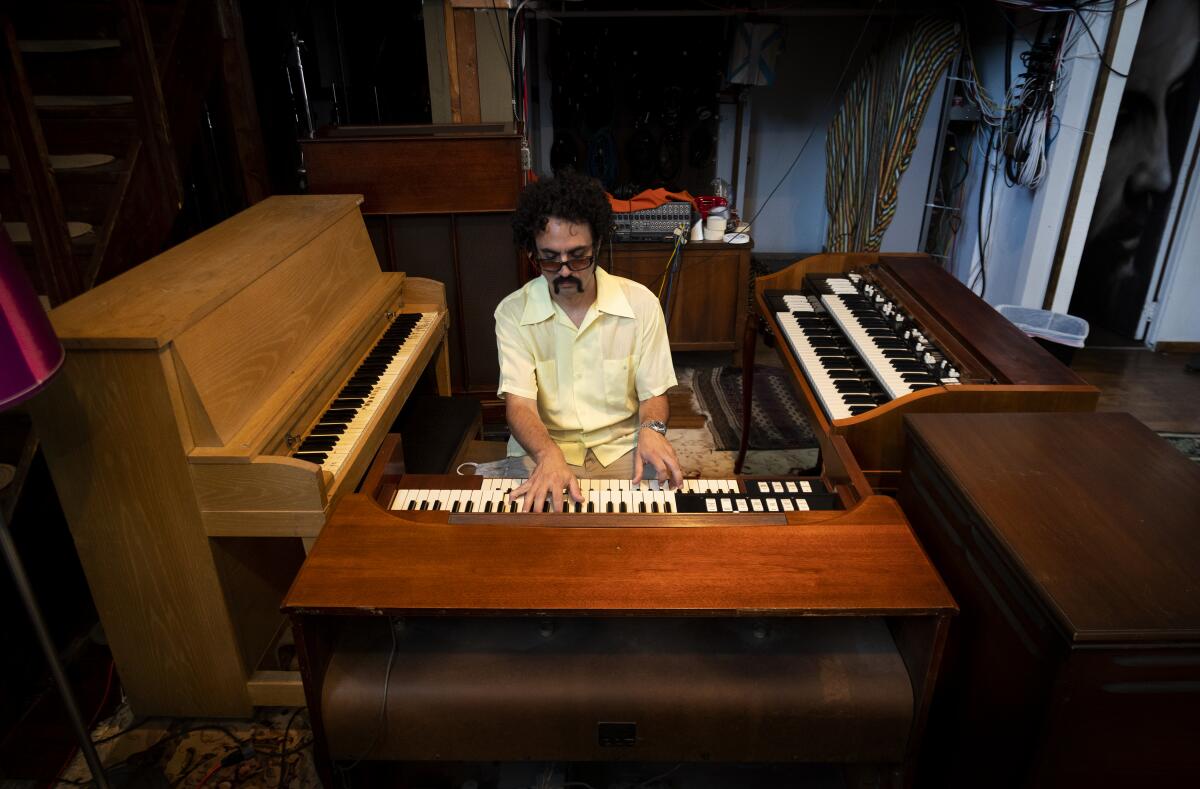In Riverside, a lauded R&B revivalist turns his attention to Chicano ‘souldies’

- Share via
The song itself sounds timeless, as if a record collector had plucked a 45 from a stall at the Pasadena Flea Market.
But “Time” isn’t an oldie, even if it vibes like a lost Stax or Motown soul side from the 1960s. It was born in a backyard a few years ago when the cofounders of the Chicano soul band Los Yesterdays, Gabe Rowland and Vic Benavides, landed at a barbecue hosted by Gabriel Roth and Tom Brenneck of Penrose Records.
A Riverside-based subsidiary of the Brooklyn throwback R&B and soul imprint Daptone Records, Penrose had a pedigree. Roth and Brenneck are best known for their instrumental and production work on Amy Winehouse’s breakout album, “Back to Black.” The pair played in the late soul singer Sharon Jones’ backing band the Dap-Kings and helped resurrect the career of the late R&B belter Charles Bradley. Roth cofounded Daptone in 2001 and relocated to Riverside about 10 years ago.
They’d heard a few Los Yesterdays records and wanted to meet the two guys in person. Music was playing at the barbecue, and at some point Rowland put on a hallucinatory instrumental track he’d written earlier that day, something that he thought sounded like “cruising down Whittier Boulevard but tripping balls at the same time.”
Getting ready to play it, Rowland offered the disclaimer that Benavides still needed to pen lyrics and nail the vocal melody.
But Benavides, 48, whose sweet, pitch-perfect voice is Los Yesterdays’ calling card, had come prepared by making up lyrics as he was driving to the party: “I go, ‘No, no! I wrote something on the way over.’” Rowland hit play, and on the spot Benavides broke into a pure doo-wop falsetto to sing the hook: “Time, time, time, ticking away.”

Not long after, Roth, who wears his hair shaggy and has a horseshoe mustache straight out of a 1970s discotheque, pitched Los Yesterdays the idea of joining forces with guitarist Brenneck to become a quartet and taking the song to Roth’s studio, which he had named Penrose, for a session.
“Time” closes out the newly released “Penrose Records, Vol. 1” and captures the essence of the label’s sound. It’s a song about a universal concern — the seemingly endless march of minutes spent away from a soulmate — delivered by contemporary Latino artists.
First released as a 45 rpm single this year backed with another retro-soul track called “Tell Me I’m Dreaming,” Los Yesterdays’ work joins eight others on the collection by the Southern California-based the Altons, Thee Sinseers, Thee Sacred Souls and Miami-based Jason Joshua.
All were issued across the past six months as a series of 45s and as the label’s debut digital collection in June. Taken together, “Penrose Records, Vol. 1” teems with slow-tempo romancers and slower-tempo weepers seemingly time-traveled from a half-century ago. Songs such as the L.A.-born the Altons’ “When You Go (That’s When You’ll Know),” East L.A. outfit Thee Sinseers’ hypnotic “Seems Like” and San Diego band Thee Sacred Souls’ “Weak for Your Love” express its sentiments with pitch-perfect clarity.
The songs were recorded at Roth’s high-ceilinged, echo-laden Penrose Studios in Riverside. The throwback-soul and doo-wop inspired songs — what Benavides called “souldies”— vibrate on the same frequency as legendary L.A. DJ Art Laboe’s weekly dance parties in late 1950s El Monte.
Less a genre than a spirit, the souldies sound of Southern California draws from pre-Beatles rock ‘n’ roll and R&B, that moment when 1950s doo-wop and simmering, oft-eerie balladry soundtracked backseat makeout sessions and windows-down cruising through East L.A., the Valley and Hollywood. The genre’s patron saint is Ritchie Valens, whose ability to combine uptempo dance numbers and downtempo love songs resonated across the region.
Combined with the rise of car clubs, cruising as a lifestyle and, eventually, lowrider culture, songs such as Santo & Johnny’s mesmerizing instrumental “Sleepwalk,” El Chicano’s slow-burning “Sabor a Mi,” Barbara Mason’s “Yes I’m Ready” and Thee Midniters’ ode to Saturday night driving, “Whittier Blvd.,” expressed the coming-of-age thrill of first-crush love and the inevitable heartbreak that followed. Across the years, that essence has been variously dubbed Chicano soul, lowrider music or, simply, oldies songs.

Roth is well-schooled on the birth and evolution of the music and thinks the connection between what he calls “the Chicano scene in California” and soul music is often overlooked in discussions on the evolution of American balladry. Referencing War’s 1975 cruising classic, “Low Rider,” Roth said that “When you talk about lowrider music or Chicano music or souldies, people think about War and these groups that had elements of salsa or Latin music.”
Roth, 45, grew up in Riverside before moving to New York for college, where he started Daptone. After Winehouse’s death, he and his wife, Veronica, moved back. Roth spent the following decade as bassist with the Dap-Kings and shuttling between Riverside and Daptone’s House of Soul Studios in the Brooklyn neighborhood of Bushwick. He’d record on the East Coast and mix in a room across the country in a historic old building called the Life Arts Center in the heart of Riverside.
In 2012, during a particularly hectic run as a for-hire producer, a well-financed label, Concord, accepted what Roth figured would be a prohibitively expensive session rate to record its artist James Hunter. “I said, ‘I’ll do it for a bunch of money if you come to Riverside.’ I thought that would close it down right there,” he said with a laugh. (Hunter is now a Daptone recording artist.)
With the cash infusion, Roth temporarily transformed a chunk of the 40,000 square-foot building into a live room. Built in 1909, the landmark facility has at various points been a YMCA and a Scientology center. Its owner, Bent Corydon, in fact, successfully sued the Church of Scientology in the early 1990s to claim the deed and had been living in the space.

The Altons perform “When You Go (That’s When You Know)”
Roth worked out a deal with Corydon by “giving him some bread to go on vacation. While he was out of town, I moved all his furniture out, ran a snake down there and moved in baffles and organs — basically built a studio from scratch.” A week and a half later when they were finished, “the band left town, I broke it all down and put his furniture back.”
The producer loved the results: “It was a rough place, but it sounded so good.” Comparing it to the classic Atlantic Records soul and jazz sessions of the 1950s and ’60s, Roth said the tone “had this big-studio, open, warm sound. It was very different from New York, where we’re used to everybody on top of each other.” He named the studio Penrose.
In Riverside, Roth became further attuned to the sounds of his Southern California surroundings. Searching for inspiration, he knew he couldn’t replicate Daptone — “That was our music and our scene from the beginning.” But warm-sounding Chicano soul has long been popular in Southern California and continues to resonate in contemporary times. Los Angeles-based singer, producer and Tyler, the Creator collaborator Kali Uchis has cited a love of oldies as being central to her sound, and Hawthorne-based Cuco earned his first viral moment when he covered Santo & Johnny’s “Sleepwalk.” The whole “wavy soul movement” coming out of Southern California is indebted to oldies.
Roth wanted use his platform to help connect some of the region’s creators to the worldwide Daptone tribe. “I’m coming into a scene that’s already here and has been here forever,” he acknowledges. “And it’s a scene that’s enjoying a renaissance in the last bunch of years.” Citing the popularity of Durand Jones & the Indications and Miami-based Jason Joshua, Roth added, “This is where they’re selling places out.” Thee Sinseers’ belter Joey Quinones, in particular, has built a loyal fanbase, as evidenced by the 2.5 million YouTube views for his 2019 record “Don’t Tell Me.”
“It’s a Chicano experience,” said Benevides. “It’s ubiquitous.”
For Roth, exploring the community was like entering a fully formed soul universe. “They know what they want to sound like. They know what they want to look like. They know who’s coming to their parties.”
The interest was confirmed at the first-ever Penrose Records showcase in December. A warmup for a planned — and coronavirus-postponed — European revue tour, the five-act bill sold out the 500-capacity Concert Lounge in Riverside. The Penrose bands had booked another sold-out showcase, ultimately postponed, at the Paramount in Boyle Heights.

For the Altons’ Adriana Flores and Bryan Ponce, the invite to head out to Penrose and work with Roth came a few years after they’d started establishing themselves on the Los Angeles underground music scene through gigs at the Hi-Hat and the Moroccan Lounge. Across a series of singles, an EP and a 2019 album, “In the Meantime,” the five-piece band (which also features Thee Sinseers’ Quinones, drummer Caitlyn Moss and bassist Gabriel Montanaldo) has explored the borderless convergence of predigital Southern California rock and soul.
The band went into the sessions with cautious curiosity. It had been in its share of studios and had established its own personality as a band. “Seeing what [Roth] uses and how he works is really cool, and that translated a lot,” said Flores. She suggested too that the experience of working in such an environment helped subtly shift the band’s direction. “We are leaning more toward an oldies sound, which is music that I’ve always been a fan of.”
Los Yesterdays’ Rowland and Benavides hadn’t met the other Penrose artists until after they’d pitched “Time” at the barbecue. Older than members of Thee Sinseers and the Altons, Rowland, 53, had been through the major-label wringer as the drummer for psychedelic funk band Momma Stud, which in the early ’90s signed a deal with Virgin Records and toured with artists ranging from Nirvana to Al Green. Another project landed a deal with Atlantic but the album never came out.
“I definitely paid my dues,” Rowland said. Across the following decade, he turned his focus to music licensing, and eventually he and Benevides started writing songs together. “That’s when we progressed on to doing these oldies in this sweet soul style.”
“We were really thinking small-ball,” added Benevides, “but we were like, ‘L.A. Latinos, Chicanos, they’re a very loyal crowd.’”
More to Read
The biggest entertainment stories
Get our big stories about Hollywood, film, television, music, arts, culture and more right in your inbox as soon as they publish.
You may occasionally receive promotional content from the Los Angeles Times.









